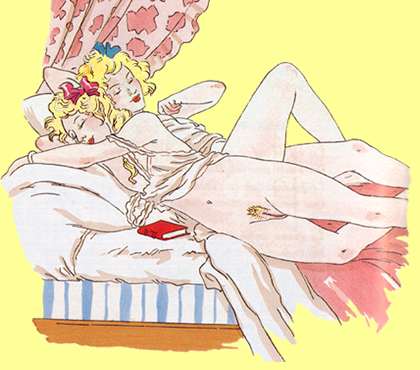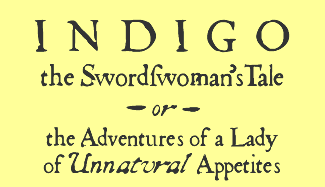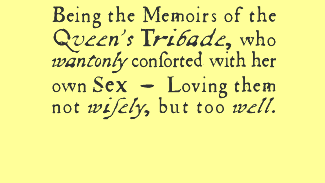Home • The
James Sisters • Fripperies
Links • About
• FTP
archives
Inexplicably Fancy
Trash

Since
The James Sisters
is (far and away) my most popular story, it would then follow by most ideas
of how this sort of thing works that Indigo would be the critical darling.
And, well, that’s true. For the most part. Certainly, it’s the
only piece I’ve written to be formally reviewed in whole or in part
(in no. 355 of the now-defunct
Celestial Reviews—in which, I’ll have you note, it scored a trifecta).
And it generates more correspondence from the various luminaries of alt.sex.stories.d
(and elsewhere)—though less correspondence overall—than its sibling.
Of course, all this could merely be due to contingencies
of timing and circumstance; to the different faces
The
James Sisters
and Indigo present, and the respective audiences
predisposed towards each; to the fact that, when scanning a list of smutty
stories available for downloading, an average reader in this day and age is
much more likely to click on anything with a potentially charged word like
“sisters” in the title than, say, “Indigo.” Certainly,
I don’t think it has anything to do with the relative quality of either
story; each is as good on its own terms as I can make it, and I don’t
play favorites—rather, since my favorite is usually the one I’m
not working on at the time, my judgment is hardly unbiased.
But enough! The only thing more boring than a writer nattering
on about his works in print is a writer doing so at a cocktail party; at least,
in print, you can skip ahead without anyone noticing. Here, then, is some
of what others have had to say about Indigo, or, the Swordswoman’s
Tale:

A Sad Donkey writes:
I saw yesterday that you aren’t sure how well Indigo
is being received. At least, you compared that reception unfavorably with
that given to
The James Sisters.
I have not yet started to read the latter story (it’s at the bottom
of a large stack of things to do), but if it is, in fact, better than Indigo,
I will be surprised. Pleasantly surprised, but suprised nonetheless. Please
don’t stop writing on it, or I may have to come play Kathy Bates to
your James Caan.
—Does it have to be James Caan? I’d much rather
be played by John Cusack. Or a younger Helen Mirren. But with an American
accent.

My Newest Fan writes:
I just finished reading Indigo, and I am impressed,
your writing is the best erotic fiction I have ever read. If you could please
send me more of your work, I would be thankful.

The One and Only Katie
McN writes:
I have been reading your stories for awhile and thought I
should be polite and let you know how much I love them.
I particulary like the Indigo series. Wonderful period
story telling (which you do so well). And, interesting and arousing “epidodes.”

Virago Blue
writes:
I just finished reading Indigo and thoroughly enjoyed
it. It had an ethereal sensuousness (is that a word? too lazy to check right
now) that kept me fixated. Wonderful descriptions, truly lovely.
Thanks for a great read. Looking forward to more.
—It is a word. But don’t let it happen again.

Michael Dalton writes:
First rate as usual.
The
James Sisters
is still a slight favorite with me, but I definitely
enjoy this one too. The gM scene you were worried about struck me as quite
consistent with the plot and not gratuitous at all. My experience is that
readers tend to go by author first and codes second. If they don’t know
the author, the codes may control, but people frequently ignore potential
squicks to read things by their favorite authors. I once wrote a very nasty
rape/snuff story because a particularly powerful idea had occurred to me,
and I could think of no other effective means of expressing it. It really
was far outside the envelope—I still regret, in some ways, having posted
it. But my regular fans all read it (or tried to) despite a lengthy warning
in the beginning. I think most people can deal with encountering squicks as
long as the author has developed good reasons for their presence and the plot
demands their use.
One thing has been bugging me, though. I may be betraying
my profound ignorance here, but what the hell is Cydonia? You speak of it
as if it’s something pre-existing, but I cannot find an answer anywhere.
I ran several extensive web searches and pulled up nothing but references
to that face
on Mars, a band,
and a variety of shrub,
none of which strike me as likely answers.
—Cydonia, or Kydonia, known to the Arabs as Rabdh
el-Djebn, and to the modern Greeks and Turks as Khania or Canea (and to the
Catholic Church as Candia), is a city on the northwest shore of the island
of Crete, founded by King Kydon, who might have been the son of Hermes, and
whose only real claim to mythological fame was sacrificing his only daughter,
Eulimene, to get better odds in whatever war he was fighting at the time.
You may read whatever you like into that.
But I only now trolled for all these facts; at the time
I started writing, it merely struck me as funny to name my city that never
was after the “complex” on Mars near the infamous supposed face.
Here’s a rather paranoid compendium
of Cydonian links; it seems quince trees are somehow involved. (Note to self:
remember to reference quince jelly, that ubiquitous feature of Portuguese
pension breakfasts, at the next opportunity.)

a shy boy writes:
I do like this story. I have enjoyed all the parts this far
it looks like you are not finished yet but if you are well it is good. other
than that I will be looking at your site at asstr thanks for letting me know.
BTW your writing is excellent throughout with no glaring
errors of grammar usage or spelling which absolutely enhances the experience
of reading the completed work.

Someone Who Doesn’t Trust Me writes:
Below is the result of your feedback form.
It was submitted by
() on Thursday, December 23, 1999 at 11:24:09
---------------------------------------------------------------------------
Your_comments: I like the classic style!! It’s hard
to find people who know how to write that way. How about some pregnant sex,
extolling the beauty of the distended female belly?
—Um, thanks. I’ll take your suggestion under
advisement.

Someone Who Knows What a Tribade is writes:
Hi, I think you are a world class writer. I am thrilled to
have found your Indigo series on the net. I have had such a hard time finding
any info on tribadism, which is the best type of sex in my mind
—You are too kind.

A Digital Medievalist writes:
Damn but you’re a sweet-tongued rogue. I’ve just
read Indigo, which I like even better than
The
James Sisters.
Indigo is quite lovely; it’s slow reading,
since I have to keep stopping to re-read a passage here, a sentence here,
but I am enamored of this novel. It astonishingly wonderful. I shall have
to slowly, carefully re-read it. Lots of evocative references, yet still unmistakenly
your own voice, not a pastiche. I very much like way you’ve established
the persona of Indigo. I don’t know if I’d like her, I probably
wouldn’t want to get close enough to find out, since she’s dangerous,
and I am a wimp.
But I would find her fascinating to watch from afar. She’s
complicated, she is. I also very much like the way you have turned the traditions
of a female narrator of A Woman of Pleasure, and the various Pearl
serials that were written by men, and sound like they were written by men,
into something I could be persuaded was written by a woman.
—Higher praise than which I could not ask.

An Aquarian writes:
Do you know what I think of when I read this work? I think
of the movie Quills, or better still, The Marquis de Sade.
Are you him? or do you just embody his quill?
—Hmm. An interesting thought. But I think I’m
still opting for John Cusack, sexy though Geoffrey Rush can be. Or Pauline
Réage. Could I be Pauline Réage, instead?

•
Home • The
James Sisters • Fripperies
Links • About
• FTP
archives
Inexplicably Fancy
Trash
Illustration by Anonymous, 1924 (?), from
a collection of poems by
Raymond Radiguet. Manipulated and retouched by N. Urfé.
•
![]()
![]()


